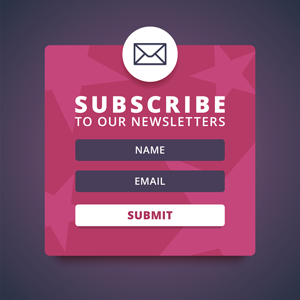

Draft a variety of pitches for your signup form, choose the best one, and edit it until it sparkles.

Most of all, don’t just go with the first thing you think of.
SUBSCRIBE TO MY NEWSLETTER FREE
If you have a signup bonus like a discount or free content, you want to tell visitors about it here. For example, if most of your content is light and humorous, you might add a joke to your signup form copy. The copy on your signup form should feel like part of your overall brand experience. Specifically, explain that you won’t spam the person or share their data with anyone else. This shows visitors that your newsletter is a unique and valuable experience. Focus on the content your subscribers will get that can’t be found anywhere else, even on your website.

Tell viewers exactly what they’ll get when they sign up for your newsletter. There are several strategies you can use to write compelling signup form copy: Some forms, like fixed bar forms, might only have space for a few words. There isn’t a lot of space for text in more signup forms, which means you’ll need to convince visitors to subscribe with one or two sentences. MailPoet signup form builder, currently displaying time-related functions 4.
SUBSCRIBE TO MY NEWSLETTER HOW TO
For more detail on how to use exit-intent forms effectively and how to set them up in WordPress, take a look at our guide. In MailPoet, this setting currently only exists for pop-up forms.Īs a MailPoet user, you can customize these settings in the sidebar of the form builder. When this setting is enabled, your newsletter signup will appear when someone attempts to leave a page. In MailPoet, time delays can be added to both pop-up and slide-in forms. Typically this is expressed as a number of seconds. This feature allows you to specify how long a person must be on your page for this form to appear. One of the biggest advantages of modern pop up and slide-in forms is that you can set them up to display after users have interacted with your content. Use time delay and exit-intent technology when possible Take a look at our ultimate guide on how to use pop-ups, slide-ins, fixed bar forms, and more! MailPoet signup form builder 3. These are a great compromise between embedded forms and pop-up forms, since they follow users through the page without obstructing content.
SUBSCRIBE TO MY NEWSLETTER FULL
When users click on this tab, the full form appears. Typically the first view of the form is a tab that appears on the bottom or side of the page asking users to click for more. These signup forms slide into view as a user scrolls down the page. Plus, you can set it up so that your pop-up form appears after users have read your content. On the other hand, this level of visibility means that people can’t escape it. Many people consider these forms intrusive, since they block the primary content from view. Perhaps the most infamous signup forms, these forms open over the page you’re looking at. These forms follow your visitor as they scroll down the page, so they can subscribe to your newsletter at any point. Also known as floating bar forms, these are signup forms in a bar across the top of your page. You can use these forms in your sidebar, the header or footer of your site, and at the end of long-form content pages. These forms are designed to be embedded directly into your content. Here’s a quick rundown of popular types of signup forms: Sometimes all you need to do is change the dimensions, but often you’ll need to create a wholly different type of form. You’ll notice pretty quickly that your usual newsletter signup form doesn’t look good in every location. This ensures that your visitors encounter your signup forms consistently as they explore your site and read your content.


 0 kommentar(er)
0 kommentar(er)
